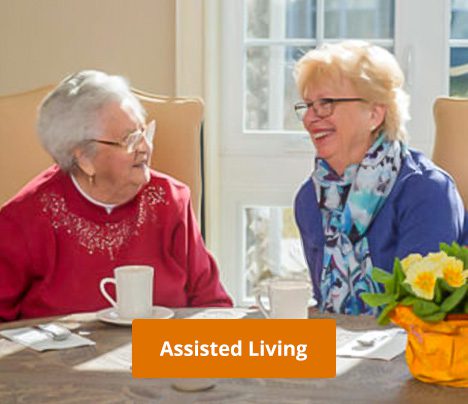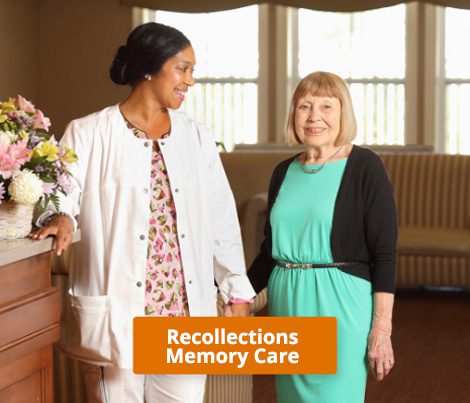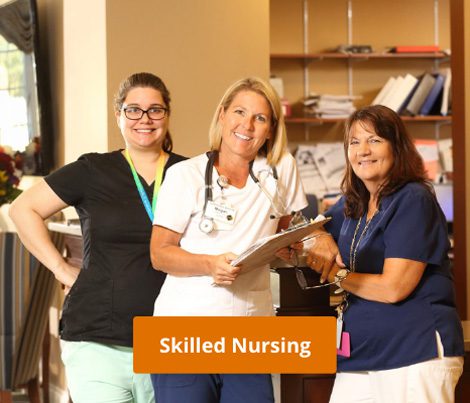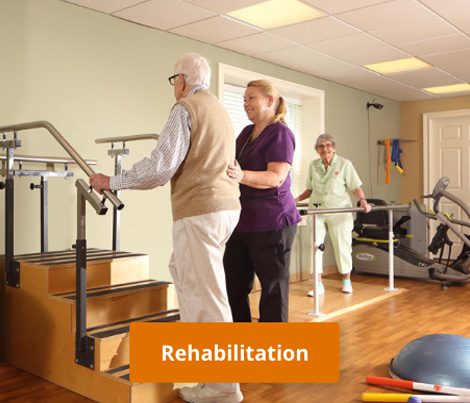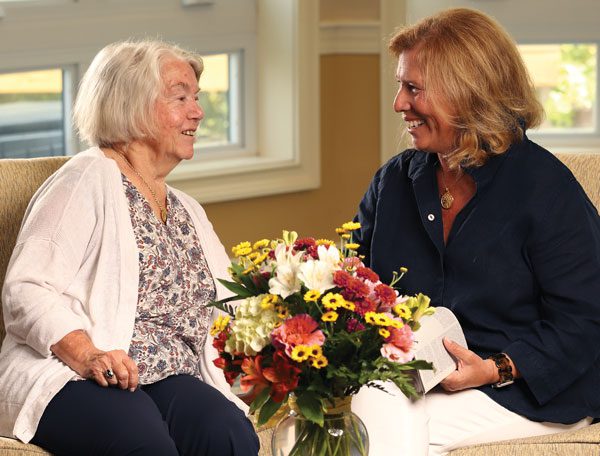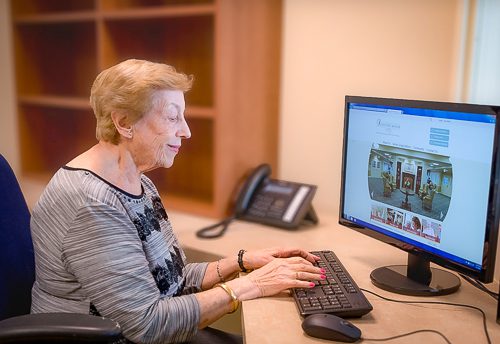Understanding Skilled Nursing & Rehabilitation Terminology
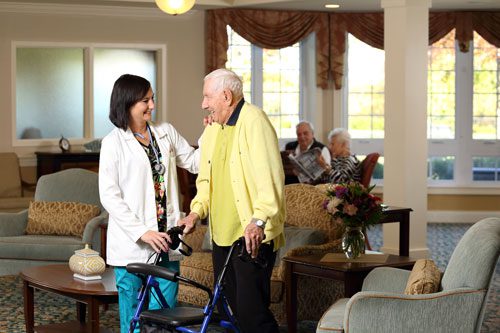
Learn 20 essential terms you need to know when a loved one is leaving the hospital.
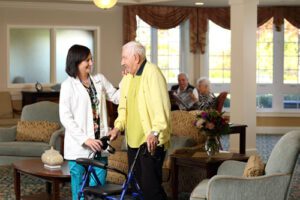 When a senior loved one has a major health event, navigating the options for rehabilitation brings many decisions to make and a whole new vocabulary of care-related terminology to learn.
When a senior loved one has a major health event, navigating the options for rehabilitation brings many decisions to make and a whole new vocabulary of care-related terminology to learn.
Understanding the language of skilled nursing and rehabilitation options for seniors can help you make informed decisions and communicate with health care providers. Read on as we bring clarity to 20 important terms, including types and levels care, different kinds of therapies, and general terminology used in senior care settings.
Skilled Nursing & Rehabilitation Terms: Types of Care
When your loved one is recovering in the hospital, you’ll hear a lot of terminology related to the next steps after their hospital stay, especially their options for rehabilitation.
- Rehabilitation – Rehabilitation programs restore physical (and cognitive) strength and independence following an illness, injury, or surgery. Rehabilitation services are generally short-term. Rehabilitation services are commonly recommended after events like a heart attack, stroke, surgery, injury, or extended illness.
- Inpatient Rehabilitation – Inpatient rehabilitation refers to rehabilitation services provided in a residential setting.
- Outpatient Rehabilitation – Outpatient rehabilitation refers to rehabilitation services provided in a clinic.
- Skilled Nursing – Skilled nursing is a type or level of care that is provided by licensed nurses. Skilled nursing services may include intravenous (IV) medication or nutrition, advanced wound care, and medication and medical condition monitoring. Skilled nursing is usually long-term.
- Acute Rehabilitation – Acute rehabilitation refers to therapies and treatments provided immediately after a major health event. Acute rehabilitation is focused on helping someone become stable enough to leave the hospital.
- Sub-acute Rehabilitation – Sub-acute rehabilitation is a short-term program of rehabilitation that may include one to three hours per day of physical, occupational, speech, and other therapies. It also includes ongoing medical monitoring and treatments. Sub-acute care is usually provided in skilled nursing or rehabilitation centers.
- Post-acute Rehabilitation – During post-acute rehabilitation, seniors rebuild strength and independence. There is still medical management and support, but the focus is more on recovery and returning home, whether home is a private residence or senior living community. Post-acute rehabilitation may be provided in a skilled nursing or rehabilitation center.
- Assisted Living – Assisted living communities are residential communities for seniors. Assisted living communities offer support with non-medical tasks like dressing, bathing, and taking medication, and provide meals and programming. Sometimes seniors benefit from a respite stay in assisted living after leaving the hospital or completing rehabilitation.
- Discharge Planning – Discharge planners, who are usually social workers or nurses, help coordinate the transition from the hospital to home or a to a care residence. Discharge planning includes arranging for necessary support services.
What happens when a senior’s health changes in a senior living community? Learn more.
Skilled Nursing & Rehabilitation Terms: Therapies and Services
These are some of the most common types of therapies and services that may be recommended during your loved one’s recovery following a hospital stay.
- Physical Therapy (PT) – Physical therapy improves mobility, strength, and balance through exercises, manual therapy (movement assisted by a therapist), and other techniques.
- Occupational Therapy (OT) – Occupational therapy helps people regain or re-develop skills for daily living, such as dressing, cooking, and using tools or devices.
- Speech Therapy (ST) – Speech therapy treats communication and swallowing disorders. Speech therapy is often recommended after a stroke to help seniors regain clear speech and reduce swallowing difficulties.
- Wound Care – Wound care is the treatment and management of wounds (including surgical wounds) and monitoring for infection or complications.
- Medication Management – Medication management is organizing, administering, and monitoring medications to ensure proper dosages, timing, and use.
Skilled Nursing & Rehabilitation: Commonly Used Abbreviations and General Terminology
These are just some of the general terms you’ll often hear in a skilled nursing and rehabilitation center.
- Activities of Daily Living (ADLs) – ADLs are self-care tasks including bathing, dressing, eating, and transferring (moving from a bed, chair, or wheelchair). A senior’s ability to manage ADLs is often used to determine which types of services will be most helpful.
- Care Plan – A care plan is a personalized document that outlines the specific care goals, services, and strategies for a resident of a skilled nursing community.
- CNA – CNA stands for Certified Nursing Assistant. CNAs, also called direct care workers or nursing aides, are trained and certified to assist with non-medical tasks, such as walking, eating, bathing, dressing, and using the restroom.
- DON – The DON, or Director of Nursing manages the services provided by the nursing personnel of a skilled nursing, rehabilitation, or other healthcare center.
- LPN, RN – LPN and RN stand for Licensed Practical Nurse and Registered Nurse. LPNs and RNs have different levels of education and responsibilities. Registered Nurses are more often in supervisory roles and can assess patients, develop care plans, and administer treatments. Licensed Practical Nurses are typically more involved in direct care.
- Medicare Star Rating – Medicare or CMS (Centers for Medicaid and Medicare Services) rates skilled nursing centers on a scale of 1 to 5 stars. Ratings for skilled nursing centers measure overall quality to help seniors and their families compare options. Ratings are based on criteria such as health inspections and staffing. Sunnyside Manor has a five-star rating.
More Resources
Whether you’re just starting the learning process or it’s time to make decisions about senior living options, we are here to help. Talk to our experts today.
And, see our guides to get answers to frequently asked questions about senior living:
- Frequently Asked Questions About Skilled Nursing and Rehabilitation
- What’s the difference between skilled nursing and rehabilitation?
- What’s the difference between assisted living and staying at home with home care?
- How do you know when your loved one is no longer safe at home?
- How do you start the conversation about senior living with your parents?
The Long Term Care & Short Term Rehabilitation neighborhood at Sunnyside Manor Senior Living is designed to meet the different needs of long-term skilled nursing and short-term rehabilitation and residents. We’re with you every step of the way.
Learn More About Why Families Rely On Sunnyside Manor
When you have questions about senior living, we are here to help. Sunnyside Manor offers assisted living, memory care, and skilled nursing and rehabilitation. Learn more about Sunnyside Manor’s resources for caregivers. Whether you’re looking for short-term support or a longer-term plan, begin with our “Getting Started” guide. Please call us at 888-696-2052 to speak with a senior living expert.
Sunnyside Manor, located in Wall NJ, is the area’s premier family-owned senior living community. The community features three distinctive neighborhoods: Independence ‘Plus’ Assisted Living, Recollections Memory Care, and Long Term Care & Short-Term Rehabilitation.

